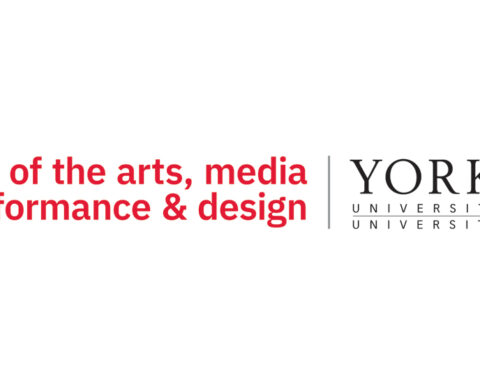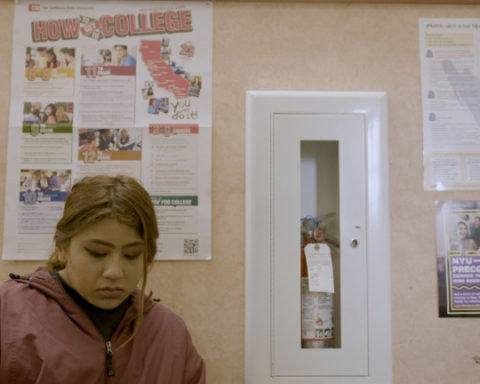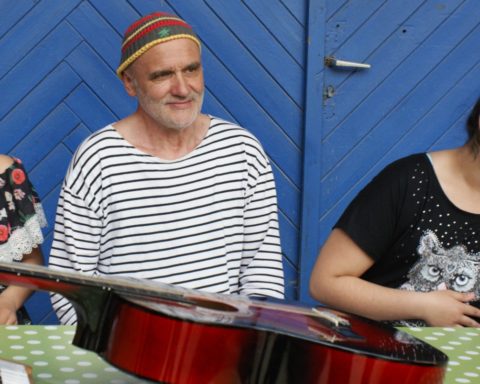Vancouver film student Celia Cobb did a lot of research before she enrolled in the Film, Video and Integrated Media programme at Vancouver’s Emily Carr University of Art and Design. “I wanted to study at a school where I knew I’d be supported in finding my own vision,” she says.
She’d learned that Emily Carr University teaches film “as an art form, and that students can experiment with the medium, and that’s exactly what I was looking for.”
Now a second-year student, Cobb initially had no concept of what kind of film she would focus on, but hoped that being around art students at the school would inspire her. Then one day, after yet another conversation with her best friend about the same topic they’d explored before, the two decided to turn their subject into a documentary.
Now, when Cobb meets women who seem open-minded and expressive, she might ask whether they’d like to be filmed discussing female masturbation for her documentary…Oh, come on! Made well, it could be a popular film! And it’s certainly unexplored territory (well, in one sense; in another sense, it’s quite well explored). Cobb says the aim of her film “is to educate and to make clear that this is a fun, beautiful subject.”
The faculty at Emily Carr University supports Cobb’s documentary. And all the top film school faculties in Western Canada, including the University of British Columbia (UBC), Simon Fraser University (SFU), Vancouver Film School (VFS) and the Banff Centre, would doubtless support it. So a prospective student might ask, what is it that sets these schools apart? Or one might wonder: Had Cobb hit on her voluptuous idea at one of these other schools, how would she turn it out? (Or, um, get it off?)
Based on widely regarded reputations each institution has gained over the years, the short answer is: she’ll go on to make a multi-screeninstallation for an art gallery at Emily Carr University. At SFU, her documentary will reveal intellectual prowess and experimental-cinema into a dramatic film, starring a Molly Parker-like star discovered in the theatre department. Vancouver Film School collaborators will help make her project an electrifying YouTube hit that gets picked by a Hollywood studio (erasing her ghastly debt). Finally, at Banff, she will produce a documentary based on her self-guided discovery.
This is generalization, of course, as each student realizes his or her own journey at each institution. You’d get a passing grade with it on a test, but you might get better marks by taking the quick class that follows on each school. (And with that, we’ll let Cobb return to her studies—and trust she’ll turn us on when her project is complete.) Emily Carr University sits first.
Emily Carr University, Vancouver, B.C.
During the four years in which students will earn a Bachelor of Fine Arts degree in film at Emily Carr University, they’ll share classes with painters, sculptors, furniture makers and other artists and designers. This artistic community is one of the school’s key advantages. Students become accustomed to thinking creatively when they hear a cultural theory question answered by a performance artist.
“Our students regard film as an art form,” says associate professor Dennis Burke at the beginning of our conversation. A composer who made soundtracks for Finding Farley, Uganda Rising and many others, Burke teaches sound and oversees final-year film projects at the school. “They create films that end up as installation; they’re making multi-screen films. But at the same time,” he says, “some will produce purely commercial dramatic films and very strong documentaries.”
One fourth-year student work he’s excited about is, in fact, “no longer a film,” he says. “It won’t be something you go into a theatre to see; it’s an environment that she’s going to create, that you walk into.”
Burke says grads with adventurous work are easy to employ. “I work in the industry, and I know those people really want employees who have ideas. You can pretty much teach anyone film technology in a month. What they really need is someone to come in who has creative problem-solving skills more than anything else.”
The school’s semester-long internship programme is acclaimed for its inventive placements. You might work with Vancouver public transit developing video kiosks for Skytrain stations, or you could collaborate with participants of the international, multidisciplinary PuSh Festival that takes over Vancouver every spring. “Students aren’t all working with production companies,” explains Burke. “It’s become a real focus for us to understand that the future of filmmaking goes far beyond what you see in a theatre.”
University of British Columbia, Vancouver, B.C.
Budding filmmakers still aspiring to steam up the local cineplex with their rom-com might find film at UBC a more suitable programme. The school has been successful at turning out some of Canada’s most notable dramatic film directors, producers and cinematographers. Reg Harkema (Leslie, My Name is Evil), Lynne Stopkewich (Kissed), John Pozer (The Grocer’s Wife), Mina Shum (Double Happiness), Bruce Sweeney (Excited), Stephen Hegyes (founder, Brightlight Pictures) and Greg Middleton (cinematographer, Passchendaele) all studied at UBC—at the same time, in 1991. Earlier this year, Julian Clarke, who graduated in 2000, was nominated for an Oscar for editing District 9. The faculty includes such luminaries as 1974 grad Nettie Wild, Anne Wheeler and Stopkewich. The latter’s narcoleptic odyssey, Kissed, was her thesis project.
Earlier this fall, Stopkewich was available to pitch the programme and she first mentions that the small school “builds a community of filmmakers and a wave of filmmaking. You have a top-notch theatre department with great actors. Bruce Sweeney met a lot of the actors he uses over and over again at UBC.” Filmmakers can study acting with theatre students or screenwriting in the creative writing department. “It’s one-stop shopping,” she says.
She salutes the BFA’s rigorous academic education, because making worthy films is “not just about being a director; it’s about having a broader educational base.” But the immersion into the art form is where school excels. Undergraduate courses include directing, camera, lighting and sound recording, and post-production techniques.
Stopkewich teaches directing, so I ask, how does she do this? “I get them up at the camera as much as possible. Sometimes it’s about identifying dramatic story structure or ways to work with actors—but mostly, it’s about just getting as much experience as possible being behind the camera and solving problems in the moment. That’s something that has to happen on your feet, not out of a book.”
Simon Fraser University, Vancouver, B.C.
Certainly, most student filmmakers would rather be on set than writing essays. Like UBC, Simon Fraser University provides crucial hands-on experience as students attain their Bachelor or Master of Fine Arts in film. In just their first year, students make two experimental films on 16mm film. This debut dual project reinforces SFU Film’s “experimental film” reputation, but it’s an effective way to teach the myriad features of cameras and editing, says associate professor Patricia Gruben, my guide for the school. Gruben, best known for her 1990 thriller Deep Sleep, has made several experimental films and teaches courses on it at SFU. But she is quick to point out that by second year, students go on to make dramatic films with actors.
SFU is known as one of the toughest schools to get into, with only 25 spots available. And even some of those students will not make it to second year, based on work and grades. (In 2009, 17 students graduated, the largest film grad class to date. It’s been said that this competitive environment is used to emulate careers of independent filmmakers.)
Third-year students focus on digital-video production. They will also take electives in cinematography, screenwriting, film sound, directing, acting and production management—all in preparation for their grad film. The summer is spent gathering crew, finalizing scripts and budgets, and casting actors—because shooting begins in September. After the shoot, the rest of the year consists mainly of post-production.
The programme is designed to develop the skills that students need to become independent filmmakers. “If you want to work on big-budget film sets, SFU probably isn’t the right school for you,” one student wrote at artschoolreviews.ca. “If you want to learn the tools to be your own filmmaker, then I guarantee it is.”
This year, SFU’s School for Contemporary Arts moved into an expanded downtown campus, housing new filmmaking facilities, including a professional shooting stage, multimedia theatres, and new editing facilities.
The three Vancouver-based schools mentioned thus far offer a bachelor’s degree, which can come in handy since a career in film can be unstable. In the event that it doesn’t work out, at least you’ll have a degree to fall back on. The two other film programmes that made the grade for this article are not universities. Both schools’ programmes can be completed in one year.
Vancouver Film School, Vancouver, B.C.
If you can manage to fork over the $35,000 tuition fee, the plan is that the intensive year spent learning at Vancouver Film School will be worth it in terms of the lucrative employment you’ll gain after graduating. Industry professionals know that the school is ranked near the top of international lists, and that it has the number one YouTube channel of any academic institution in the world. They are kept abreast of every new success, such as the fact that 42 of its graduates worked on District 9, including director/writer Neill Blomkamp and his co-writer Terri Tatchell, who received an Oscar nomination for best screenplay adaptation.
Other notable grads include Clerks director Kevin Smith (who actually dropped out but was later given an honourary certificate), Neil Kopp, who produced Gus Van Sant’s Paranoid Park, and many successful actors. The faculty includes Robert Grieve, Oscar-nominated for sound, Silverado; Michael S. Baker, a writer for Three’s Company, The Jeffersons and other television hits; and the aforementioned John Pozer, director of The Grocer’s Wife.
Pozer tells me that VFS was founded on the philosophy that one year of concentrated production work is more valuable than four years of theoretical instruction. There’s no such thing as “downtime” at the school each day is filled with learning and creating.
“It’s a real film immersion,” Pozer stresses. “It’s hands-on, skills-based. Our grads are seen differently because of their year of being totally immersed in film production.”
The curriculum is divided into six eight-week terms, each building on the lessons developed during terms before it. Starting with short-documentary projects in first term, students move on to specifics such as lighting and art direction; by the end, they’ll have a professional-quality short film—their calling card to the industry. The school has just added a 70,000-square-foot shooting space. “There’s no other film school, I would hazard to say, in the world that can compete with the facilities at VFS,” says Pozer.
The Banff Centre for the Arts, Banff, Alta.
Alberta’s Banff Centre certainly comes close. A mountain retreat situated in the midst of Banff National Park, it is a unique film school in Western Canada, renowned both for being a catalyst for creativity and its first-rate facilities.
Filmmakers can choose from three distinguished programmes: the work-study opportunity; film residencies in post-production and production; and the self-directed post-production residency. The school also offers a range of workshops, like the esteemed Adventure Filmmakers’ Workshop.
Work-study programmes are designed to expand the skills of filmmakers, who may work with visiting filmmakers, artists, researchers or faculty. They may also film Banff Centre productions, collaborating with participants in other departments, such as Visual Arts, Theatre Arts or the New Media Institute. Working within this team environment, participants are guided and evaluated by mentors on a regular basis.
Film residencies allow mid- to-senior-level producers to develop all aspects of production for their projects. Banff Centre staff and work-study participants provide advice and hands-on support for these projects. Acceptance into the residency is based on the merit of the project, and while priority is given to those with strong Canadian content, all applications are welcome.
Filmmakers and television content producers, who do not require artistic or technical support, have the ability to use Banff Centre’s editing suites as part of the self-directed post-production residency programme.
“Banff Centre offers participants the chance to design their own experience based on their own goals,” says Jean Macpherson, the school’s Film and New Media programme manager, during a phone interview. “You leave with knowledge and know-how and a network of people who work in the field in Canada and internationally. The job opportunities are unbelievable after participating in the work-study programme or the Adventure Filmmakers’ Workshop: All these people know what your passion is.”
And that’s the bell. Class dismissed.











